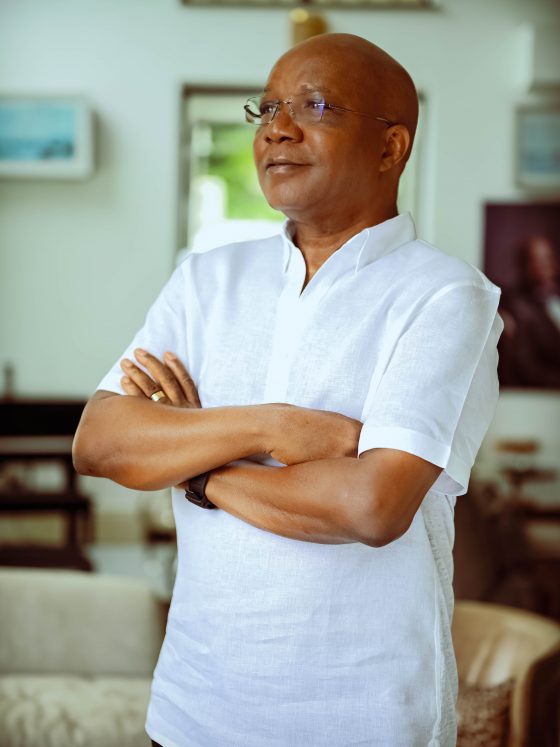With a political career that spans over two decades, Governor Oyebanji has become one of the most experienced and respected leaders in Ekiti State, having served in various capacities, from Special Adviser to Commissioner and Secretary to the Government of Ekiti State, before ascending to the governorship. His rise to the top was not accidental but the result of hard work, perseverance, and an abiding faith in the principles of good governance and community service. Sworn in as governor on October 16, 2022, he inherited a state that was already thriving but needed a stronger push toward sustainable development and economic transformation. Today, he speaks candidly about his administration’s efforts in human capital development, infrastructure expansion, industrialisation, agriculture, youth empowerment, and governance reforms, all anchored on his administration’s mantra of “shared prosperity.” He also discusses the challenges he’s faced, his unwavering commitment to delivering on his promises, and the path forward for Ekiti State.

Congratulations, Governor Oyebanji! Two years at the helm of affairs in Ekiti State—what thoughts and emotions run through your mind as you reflect on this remarkable journey?
Gratitude. It’s been gratitude all the way. I am eternally grateful to God Almighty for the grace and opportunity to serve my people. I remain extremely grateful to the good people of Ekiti State for electing me to serve them.
Looking back at your inauguration, you set out some ambitious goals. How have these priorities shaped the direction of your administration over the past two years? Any unexpected turns along the way?
We have a pact with the people. We campaigned on the mantra of continuity of good governance and shared prosperity for our people. In order to actualise our part of the bargain, we came up with six pillars of administration: youth development and job creation, human capital development, agriculture and rural development, infrastructure and industrialisation, arts, culture and tourism, and governance. These have shaped our development efforts. This development agenda was also drawn from the 30 year development plan of the state (2021-2050), which was developed while I was Secretary to the State Government. So, we are well guided in our development efforts right from inception.

You’ve undoubtedly had many accomplishments over these two years. Could you highlight a few standout achievements that hold special significance for you?
Let me be frank with you, regardless of whatever people describe as our achievements in the areas of infrastructure upgrade, human capital development, education, health care delivery, inclusion, and security, one thing that gladdens my heart is seeing the people happy. Whenever we do something that makes the people happy—either the old, the youth, the women, or the civil servants. Whenever I see them smile, it gives me great joy. And that is regardless of the nature or magnitude of the development. For some people, it may be the road construction in their area that gives them joy. Some, it may be perimeter fencing of their community school. Some, it may be the free delivery for pregnant women in their primary health centre. In some communities that have been without power supply for over ten years, it may be reconnection to the national grid or energising of their transformer. To some market women, it is being able to get financial support for their business. To some youths, it is being connected to economic opportunities or provided with a platform to exhibit their God-given talent. I have seen people leap for joy over what seems insignificant. I have come to realise that the majority of our people are happy once they have access to basic necessities.
Your leadership philosophy revolves around “shared prosperity.” What tangible evidence can you share to show that this vision is becoming a reality for the people of Ekiti State?
Being able to put over a thousand youths into agribusiness with support from the government and our development partners is one of them. The turnover of some of these young farmers in the next year is best imagined. Those youths were drawn from six local governments that have subscribed to the scheme. By the time youths from all 16 local governments participate fully in the programme, I can imagine the output in terms of food surplus and income of the net worth of the young farmers. We were also able to secure financial support for market women through a scheme with a commercial bank. In the last 24 months, we have been able to connect over 20 towns and communities that had hitherto been without electricity for upward of ten years. Imagine the effect on commercial activities and the prosperity of the people. Our administration has executed many empowerment initiatives for our citizens, especially those who are not in the employ of the state government. We have put job creation on the front burner, and we have diligently pursued this since we came into office. We have created more jobs for our citizens in the areas of employment of more civil servants to inject fresh blood into our bureaucracy. We have also employed and trained more teachers, thereby attracting more pupils to our schools based on the facilities we have put in place as well as the quality of teachers. We have created more jobs through our investment in the Ekiti economy in the areas of agriculture, tourism, infrastructure development, and deliberate patronage of competent local contractors through our local content policy. Our administration also ensures payment of the backlog of arrears of gratuities to our retired pensioners, and this will have multiplier effects on the grassroots economy. We have also empowered our petty traders, market men, women, and artisans by granting them access to credit facilities to boost their businesses. So, we are on track with our vision to make shared prosperity available to our citizens for them to find fulfilment in our dear state. We are also providing opportunities in ICT, sports, agriculture, creative arts, etc.

With your background as a lecturer and seasoned public servant, how have these diverse experiences shaped your leadership style as governor? Any lessons that have proven invaluable?
I think in the area of responsiveness and being courageous and honest and straight forward. The people know that I won’t promise them what I will not do. And I will do whatever I promise them. This has worked for me, and at any particular time, the people know my stand on any issue. We have TRUST, INTEGRITY, and SERVICE in governance.
Having served in various government roles and under different administrations before assuming the governorship, what unique insights have you brought to this position that you believe have made a difference?
One major advantage that has been conferred on me is that I have seen a lot of very difficult decisions being made. I have also seen good policies that failed to resonate with the people and were therefore rejected by the people even when they were done with the best of intentions. Having worked closely with two of my predecessors, Otunba Niyi Adebayo and Dr. Kayode Fayemi, I also can say that I knew certain decisions they took while in office that backfired and some that they took that earned them accolades. So, in a way, I can say that I had the privilege of being placed on the shoulders of giants, hence I could see afar.
I also watched closely from the sidelines the administrations of Governors Ayo Fayose and Segun Oni.
Balancing the continuity of your predecessor’s projects while introducing your own initiatives can be tricky. How do you ensure a seamless blend of old and new for the benefit of Ekiti State?
Like I said, we campaigned on the mantra of continuity of good governance and shared prosperity. That is even outside the fact that there is a law in Ekiti State that makes it mandatory for an incumbent to complete any project inherited from his predecessors in office. So, my job is well cut out. Aside from the fact that I was part of the immediate past administration and understood the efforts that went into those projects, I believe the money that has been spent on them is the taxpayer’s money, so why not use the same taxpayer’s money to complete the projects instead of abandoning them to start new ones that are my own? So, from day one, we know that we will complete all the projects we inherited and put them to proper use by the people and then start new ones.

Nigeria, like many nations, is grappling with economic challenges. What strategies has your administration employed to shield Ekiti’s economy and maintain stability during these turbulent times?
We are focused on our areas of comparative advantage: education, human capital, innovation, and agriculture. We are using these to build a bigger economy. We are also introducing our youth to technology and innovation so they can earn mega money in the digital economy. Our investment in agriculture is multi-dimensional. We use agriculture to ensure food security; we also use it to empower our youth, and then we partner with big names in agribusiness to drive industrialisation.
Education has always been a personal passion of yours. What initiatives are you championing to elevate the standards of education in Ekiti, and how are you tracking their progress?
We are revitalising vocational education by properly equipping our technical colleges and making sure vocational education is not seen as inferior. We want our youth to be able to attend our technical colleges to learn a vocation as a matter of choice, not because of failure or out of desperation. Not everybody will get a white-collar job, so our approach is to encourage our youths to embrace entrepreneurship and become business owners. We have strengthened the Office of Transformation, Service Delivery, and Strategic (OTSD) to ensure seamless tracking of Ministries, Departments, and Agencies (MDAs) progress, and I am very satisfied with the progress made so far.
The arts, culture, and tourism sectors in Ekiti have so much untapped potential. What are you doing about making Ekiti a destination of choice for tourists and investors alike?
We are changing the narratives already. And I am glad to say here that we have been able to make a success of the Ikogosi Warm Springs resort, which has been transformed into a world-class resort through our collaboration with a renowned hospitality firm, Glosieth Hospitality. Today, Ikogosi is back as one of the leading resorts in the country with potential for expansion. We are currently working on our tourism masterplan with support from UNTourism and other stakeholders. We have marked out three major centres as tourism centres that would be developed and will become centres of attractions. One of the defining steps taken is the redesignation of the supervising ministry as the Ministry of Arts, Culture, and Creative Economy. This stems from our belief that we can use culture to create wealth, to create jobs, to empower our people, and even generate revenue into government coffers. One of the steps taken was to turn Ekiti State Cultural Troupe into Ekiti State Performing Arts Company, thereby making it a revenue-generating enterprise, and the company has been doing very well within and outside the country. Ekiti is becoming a big hub for the sale and marketing of cultural products like costumes, clothes, souvenirs, mementoes, and iconic objects that have cultural and historical value. As we speak, work is ongoing on the construction of the International Centre for Arts and Culture, which is another legacy project for the people of Ekiti. The project, when completed, would have facilities like a theatre for performances, an events hall, a gallery of modern arts, and sixteen huts (representing each of the constitutionally recognised local governments) where works of arts and crafts that define the people of the LGAs are showcased. The Cultural Centre will also have an Artiste Camp where people who come to make films can reside, a mall, an editing suite, studios, a research library, and a museum capable of attracting arts researchers and scholars from within and outside the country. Another unique feature of the Cultural Centre under construction is that despite being wholly owned by the state government, it is being built to attract grants and funding from the United Nations Education, Scientific, and Cultural Organisation (UNESCO) and other international bodies. We are planning to touch the nearby Arinta Water Falls along the same tourism corridor in line with our desire to make Ekiti occupy its pride of place in tourism.
Gender equality and women’s empowerment were key priorities for the previous administration. How is your government building on that legacy, and what new policies have you introduced to advance this cause?
I will say we are building on it. We are taking it further by strengthening the legal and policy frameworks. As of today, Ekiti can boast of being the state with the highest number of women in elective and appointive positions in government. The Deputy Governor is a woman. We have a female as head of the Customary Court of Appeal in the state. The Secretary to the State Government, the Head of Service, and the Accountant General of the state are all women. We have six female members in the State Assembly; seven female local government chairmen; 15 vice chairmen of councils are women; and we have 33 councillors who are women. It is not just about the statistics, but the fact we have successfully created for the women a platform to be heard and seen.

Is being governor everything you thought it would be? Any surprising aspects you didn’t anticipate?
I had the benefit of 11 years of preparation; there is nothing strange about the office.
Looking ahead, what is your vision for Ekiti State as you move forward in your term? What legacy do you hope to leave behind?
I want to be remembered as a governor that brought prosperity to Ekiti and as a governor that tells the truth.
Balancing the demands of public service with family life can be tough. How do you stay grounded and connected with your loved ones amid your busy schedule?
It has been very tough. I have not been able to strike a balance, but my wife and children have been extremely supportive, and I am grateful to them.
Are there any upcoming projects that you’re particularly excited about—something that could be a game-changer for Ekiti State?
The Ekiti Knowledge Zone (EKZ) and Special Agric Processing Zone (SAPZ).
Success is measured in many ways. How do you personally evaluate the impact and effectiveness of your administration’s policies?
Our main yardstick is the number of citizens that can be impacted to live a decent life. In addition to that is the increase in the number of people who are coming to Ekiti to live, work, invest, and rest. Those two are quite important in our measurement.
If you could go back and do your first two years over again, is there anything you’d approach differently or a strategy you’d adjust?
So far, no.
In the broader context of Nigeria’s development, what role do you see Ekiti State playing, and how are you positioning the state to contribute to national growth?
I see Ekiti becoming the food basket of the country. We are working towards that. We have the required manpower, large arable land, and the determination as a government, and we have started already. We plan to give agriculture more attention in 2025. Our Bring Back the Youth in Agriculture is an ambitious project that will see our youth cultivating about 5,000 hectares across different parts of the state. The regular farmers are also being supported through our tractorization programme, land clearing, and improved seedlings. Our Agro-Allied processing zone will also play a key role in our bid to drive development and industrialisation through agribusiness.
Aside from this, I see Ekiti becoming Nigeria’s Silicon Valley. And this will be achieved through our knowledge zone, for which we have received 80 million dollars of support from the AFDB. These for us are the game changers.
As you celebrate this two-year milestone, what’s your message to the people of Ekiti State, who’ve been your partners on this journey?
Gratitude. I appreciate and remain eternally grateful to our people for their support.













